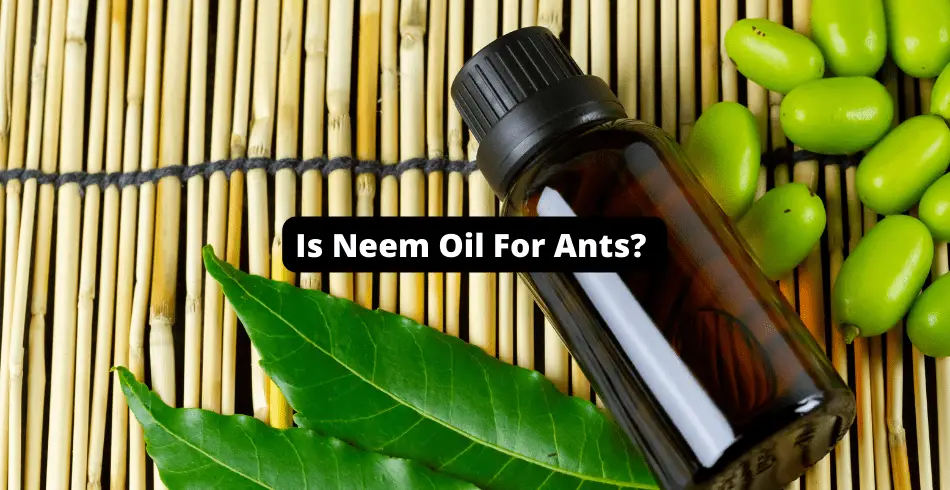Ants are usually beneficial insects, but not when they’re crawling around your kitchen.
Ants raise and care for aphids because they feed on the sugary excretions they produce.
An aphid infestation on plants leads to poor crop health and reduced productivity.
When faced with an ant or an aphid problem, you can keep ants away from the plants by applying chemicals or natural control substances.
Some organic ant control substances made from essential oils of naturally occurring plants work great.
These substances include peppermint, orange, cinnamon, and rosemary extractions.
Neem oil is also an organic substance you can consider to get rid of ants before turning to chemicals.
In this article, we look at neem oil for ant control, share tips on making neem spray, and suggest some neem products in the market.
Let’s get started.
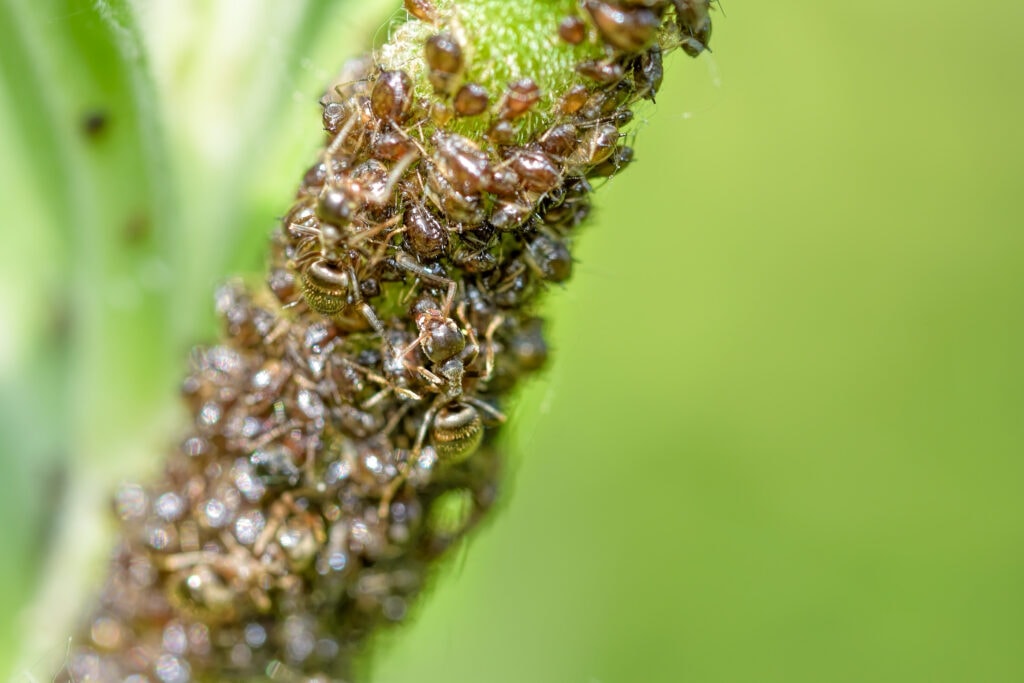
What is neem oil?
Neem oil is a product of the neem tree. All parts of the neem tree, leaves, seeds, roots, or bark are useful for their medicinal or insecticidal properties.
Neem oil is extracted from the seeds through cold pressing. Once extracted, it’s treated with alcohol. Alcohol treatment causes Azadirachtin, a chemical substance in the raw neem oil, to separate from the rest of the ingredients.
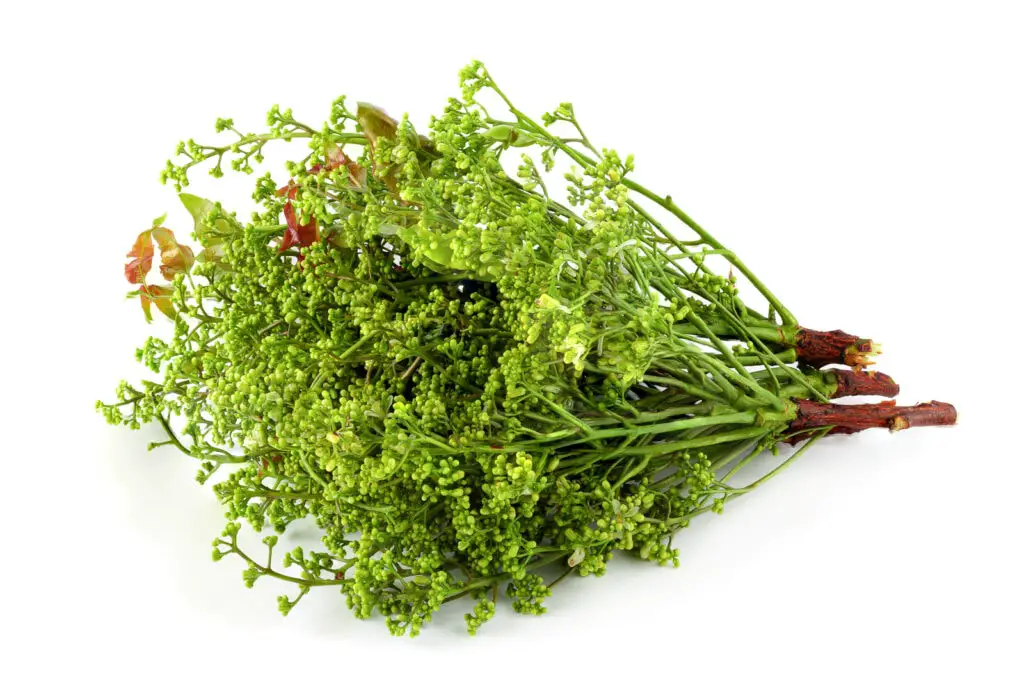
The remaining neem liquid forms what is commonly referred to as a clarified hydrophobic extract of neem oil.
[amazon box=”B007CRG4CW”]References:
https://pubmed.ncbi.nlm.nih.gov/15777222/
https://www3.epa.gov/pesticides/chem_search/reg_actions/registration/fs_G-127_01-Oct-01.pdf
Does neem oil work for ants?
Azadirachtin and clarified hydrophobic extract of neem oil are the two active ingredients in neem oil.
They’re effective insecticides. However, their usefulness in killing ants, aphids, and other insects varies.
Azadirachtin is a slow-acting poison that kills ants or pests once ingested.
Once eaten, it tampers with the metabolism of the ants. It reduces and alters feeding behavior.
Starvation eventually kills the ant.
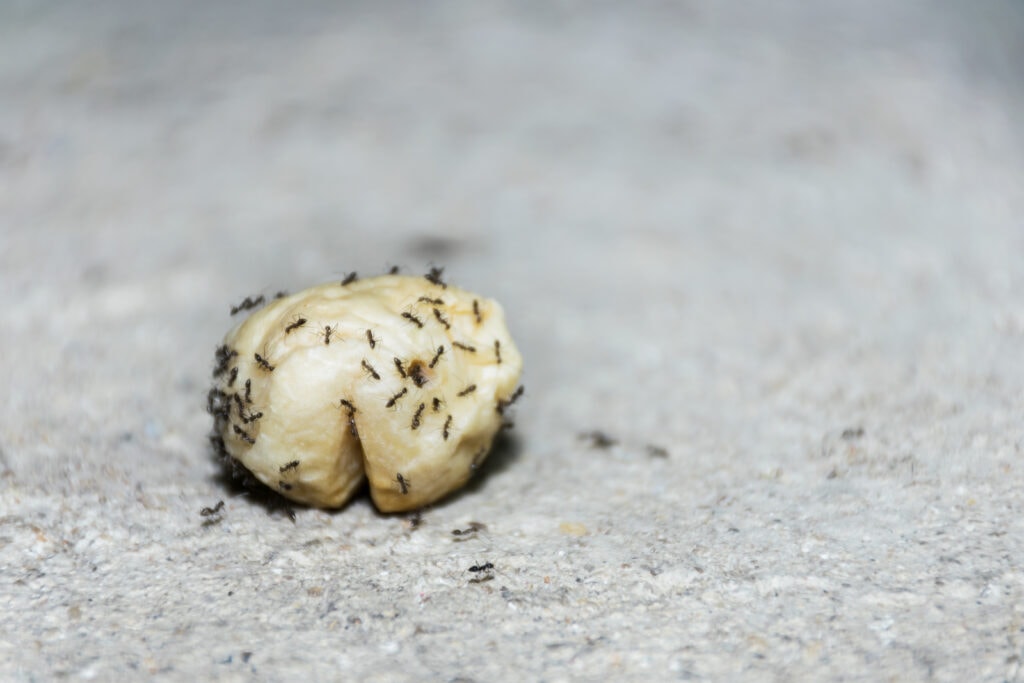
Azadirachtin neem oil also negatively affects the insect’s hormonal system modifying egg-laying patterns, sterilizing the target, and killing larvae, thus hampering colony growth.
Clarified neem oil, on the other hand, is a suffocating agent.
As a pest control substance, it kills the ants on contact by blocking the spiracles.
Neem oil products are effective against a wide range of insects.
However, they’re not conspicuously indicated for the control of fire ants.
Nonetheless, some studies using neem oil solution to kill fire ants show that the product is potent when poured directly on fire ant mounds.
Notably, neem oil’s effectiveness is lower than orange oil’s.
References:
https://aggie-horticulture.tamu.edu/organic/files/2011/03/Kim-Schofield-fire-ant-control-31.pdf
How to use neem oil for ant control
As discussed earlier, neem oil is available in two formulations per the active chemical ingredient in the product, Azadirachtin or clarified extract of neem oil.
In both cases, neem oil is applied in wet form.
To apply, spray a neem solution that contains Azadirachtin on garden plants where ants are tending aphids.
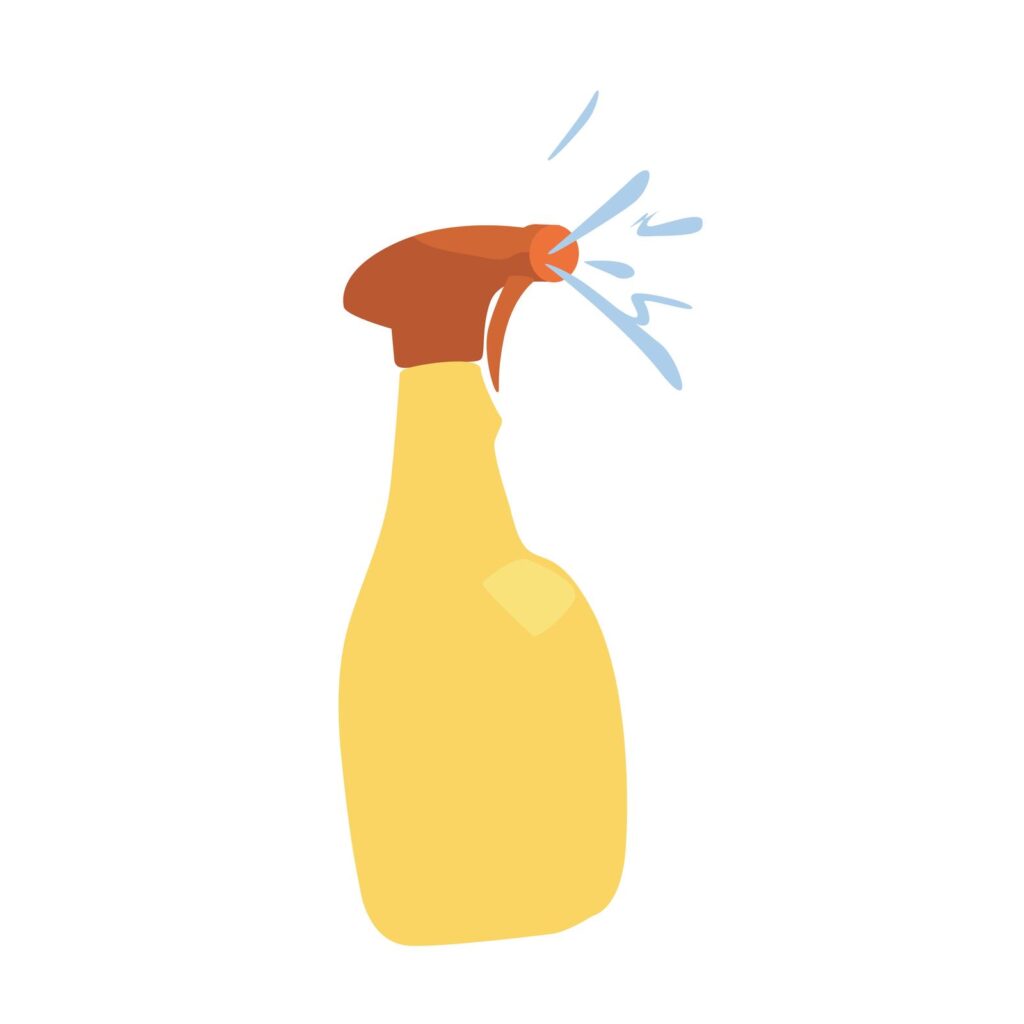
The Azadirachtin active chemical kills the ants and other insects slowly.
Ants ingest the sugary excretion by aphids which is contaminated with the neem poison.
Workers take excess honeydew to the nests to feed the nestmates. When they feed on toxic food, they also get poisoned.
The effects of the Azadirachtin neem oil are slow acting and noticed over time as the ant population reduces after dying from the effects of ingesting the poison.
Azadirachtin neem oil works against ants in the entire ant colony.
[amazon box=”B007CRG4CW”]Clarified extract of neem oil kills ants on contact.
If you notice trails of ants in your garden or on plants, apply clarified neem oil spray directly on the ants. A clarified extract of neem oil solution will kill aphids and ants.
To control ants indoors or on walls, spray a clarified extract of neem oil solution on the ant’s infestation or areas where ants frequent.
Neem contains a strong, pungent smell.
Once sprayed, it masks ant pheromone trails disrupting their movement. The strong smell also repels ants.
Relevant Viewing:
References:
http://npic.orst.edu/factsheets/neemgen.html
How do I make a neem oil solution?
You most likely will encounter many recommended mixing ratios when making neem oil spray.
Therefore, be sure to read the product label keenly.
To make a neem solution, you need the following;
- Clean water
- Cold-pressed neem oil
- A table or teaspoon
- A spray bottle or mixing container
- Dishwashing soap
Add half to one (1) tablespoon of neem oil in a quart of water (about four cups).
Neem oil and water do not mix readily. Add approximately half a teaspoon of liquid dish soap to overcome this problem.
The dishwashing soap acts as an emulsifier. Shake this mixture of water thoroughly until all the ingredients dissolve completely.
Use the neem soap to spray the infested areas.
Apply directly on ant trails.

High concentrations of neem spray can damage plants. Before spraying all infested plants, test your solution on a few leaves.
Which neem oil is the best?
Neem has many applications, including its usefulness as a pesticide, pet shampoo, toothpaste, and cosmetic.
Below is a selection of neem-based products formulated for the control of ants and other pests;
- Azatin O Biological Insecticide– Azatin has a 4.5% Azadirachtin concentration. It’s broad spectrum and is a growth inhibitor. It kills pests at all stages of their lifecycle, including the larvae.
- Molt-X is 3% Azadirachtin– It’s not neem oil but an emulsifiable concentration made from neem seeds. It works as a growth inhibitor, antifeedant, and the ant or pest sterilizer. You can apply it as a soil drench or leaf spray.
- Triact 70 – unlike the two products above, Triact is a clarified hydrophobic neem oil extract. It’s a broad-spectrum natural pesticide and fungicide. Triact neem oil can be used indoors and outdoors to kill and deter ants. It has a short Restricted Entry Interval (REI) of only four hours.
- BONIDE Neem Oil is a ready-to-use product – a 70% clarified hydrophobic extract of neem oil. Like Tract, it has a short REI of 4 hours.
Neem has a short activity period (7-14 days). Monitor results after each spray and repeat as may be needed. Always adhere to the manufacturer’s instructions.
[amazon box=”B007CRG4CW”]Clarified hydrophobic extract of neem oil is toxic to bees and marine life. Apply on plants sparingly and during early morning or late evening when pollinating insects are least active.
References:
https://www.ohp.com/Products/triact_70.php
Neem oil, an effective ant control pesticide
In ant and pest control, neem oil is effective and safe.
The most common active neem ingredient is Azadirachtin.
It kills ants slowly after they ingest the chemical.
This substance acts as a feeding suppressor, growth inhibitor, and sterilizer.
Clarified neem oil, on the other hand, is a suffocant.
It kills ants when they come into contact with it by blocking the air passages.
You can also use neem oil to deter ants. The strong odor of neem oil repels ants away.
Gardeners or homeowners looking for alternative ways to kill ants without chemicals or prefer natural insect control methods can use neem oil.
Neem oil is an effective ant repellent safe to use around other animals, pets, and kids.

